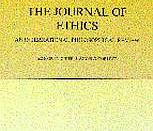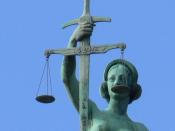Explanation and Definition of Ethics:
Ethics addresses in what ways it is morally proper to behave. However, in order to study the field of Ethics, or for the field of Ethics to even exist, two assumptions must be made. First and foremost, humans must have free will to make their own choices. The second assumption is that there are standards by which to determine what is right and what is wrong. The choices we make are supposed to be made based on a universal code of right and wrong. With our free will and with our capacity to understanding what is right and wrong, we as humans are responsible for our own actions.
Origins and Role in Modern Society:
The origins of ethics are obviously just as debated as the existences of ethics in the first place. Some will argue ethics and morals are religious and divine parts of the human entity.
Others say ethics are inherently human and distinguish us from animals. "Some historians consider that ethics arose this way. Primitive tribes do not really need ethics. For a cohesive group tribal law is sufficient regulation, while harsh conditions of primitive life, where stupid or selfish behavior could lead to extinction of the tribe, limits options of behavior anyway. But as civilization developed and agriculture created abundance, people began to live beyond the confines of tribal groups. So they required more universal methods of regulation than tribal law could provide. Ethics enabled people to carry tribal codes "inside their heads". So as tribal life diversified, people could adhere to original teachings even after they traveled outside their own group" (Unknown). Of course all this might be pointless discussion if ethics do not even exist.
Assuming ethics does exist, its role in society is to give us guidelines...


